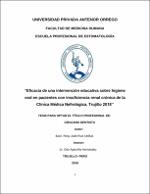Eficacia de una intervención educativa sobre higiene oral en pacientes con insuficiencia renal crónica de la Clínica Médica Nefrológica, Trujillo 2018

View/Open
Download
(application/pdf: 500.3Kb)
(application/pdf: 500.3Kb)
Date
2019Author(s)
Ruiz Ubillus, Rosy Judit
Metadata
Show full item recordAbstract
Determinar la eficacia de una intervención educativa en higiene oral de pacientes con insuficiencia renal crónica.
Material y Método: El presente estudio es cuasi-experimental. Se evaluó a 80 pacientes con insuficiencia renal crónica sometidos a hemodiálisis de la Clínica Médica Nefrológica, utilizando un material educativo (rotafolio y maquetas) para enseñar al paciente sobre higiene oral. Se examinó al paciente utilizando la técnica de higiene oral de O’Leary antes y a los 15 días después de la intervención educativa. Para la confiabilidad se utilizó el método estadístico Kappa, siendo la medida de concordancia entre el experto y el tesista buena de Kappa= 1.000.
Resultados: A la evaluación con el Índice de Higiene Oral (IHO) O’Leary se encontró a los pacientes en el nivel deficiente con un 100%, y después de realizar la intervención educativa (IE) se encontró en el nivel deficiente con un 61% y regular con un 39% , disminuyó después de la intervención educativa en 39% a regular en mujeres; y en varones el 74% fue deficiente. Según grupo después de la IE, el grupo etario de 31 – 42 años fue el que presento una mejora en 60% regular.
Conclusiones: La intervención educativa fue eficaz en el nivel de higiene oral en pacientes con insuficiencia renal crónica, de la Clínica Médica Nefrológica. Determine the efficacy of an educational intervention of oral hygiene in patients with chronic renal failure.
Material and Method: Quasi-experiment. We evaluated 80 patients with treatment of hemodialysis at the Nephrology Medical Clinic, using educational material to teach the patient about oral hygiene. The patients were examined using O'leary's oral hygiene technique and also 15 days after the intervention. For reliability, we used the Kappa statistical method, the measure of concordance between the results of the oral hygiene index of the expert teacher and the oral hygiene index of the thesis Kappa = 1.000.
Results: In the evaluation with the IHO O'Leary, the patients had a deficient level of 100%, and after the educational intervention (DIE) the level was deficient with 61% and regular with a 39 %, and decrease after the intervention in 39% regular, in the case of females and 74% of males.According the age, after the intervention the people between 31 – 42 years had the result of 60% regular.
Conclusions: The educational intervention was effective to increase the level of knowledge in oral health and oral hygiene level in patients with CRF, at the nephrology medical clinic.
Collections
- Estomatología [687]

